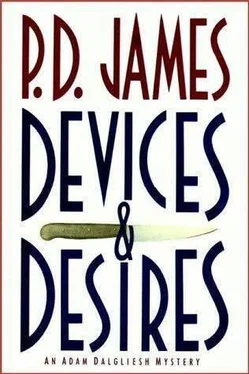'Put your head close so that I can whisper. Mr Dalgliesh is going to be one of the guests. I want it to be a surprise.'
The pale golden head leaned forward towards the grey and Miss Mair whispered. Theresa smiled and then nodded with serious satisfaction in a moment of grave feminine conspiracy.
It was Alice Mair who directed him to the cottage. After about a mile they turned seaward and the Jaguar lurched and bounced down a narrow track between high, untended hedges of bramble and elderberry. The track led only to Scudder's Cottage, the name crudely painted on a board nailed to the gate. Beyond the cottage it widened to provide a rough, gravelled turning, backed by a forty-foot bank of shingle behind which Dalgliesh could hear the crash and suck of the tide. Scudder's Cottage, small-windowed, picturesque under its tiled, dipping roof, was fronted by a flowering wilderness which had once been a garden. Theresa led the way, between grass almost knee-high bordered by a riot of unpruned roses, to the porch, then reached for a key hung high on a nail, less, Dalgliesh supposed, for security reasons than to ensure that it wasn't lost. With Dalgliesh carrying Anthony they passed into the cottage.
It was much lighter than he had expected, largely because of a rear door, now open, which led to a glass extension giving a view of the headland. He was aware of the room's clutter, the central wooden table still covered with the remains of their midday meal, an assortment of plates smeared with tomato sauce, a half-eaten sausage, a large bottle of orangeade uncapped; the children's clothes thrown over the back of a low nursing chair before the fireplace, of the smell of milk and bodies and wood smoke. But what held his attention was a large oil painting propped on a chair and fronting the door. It was a three-quarter portrait in oils of a woman, painted with remarkable power. It dominated the room so that he and Alice Mair stood for a moment, silently regarding it. The painter had avoided caricature, if only just, but the portrait was, he felt, intended less as a physical likeness than an allegory. Behind the wide, full mouth, the arrogant stare of the eyes, the dark, crimped, Pre-Raphaelite hair streaming in the wind, was a careful delineation of the headland, its objects disposed and painted with the meticulous attention to detail of a sixteenth-century primitive; the Victorian rectory, the ruined abbey, the half-demolished pillbox, the crippled trees, the small white mill like a child's toy and, gaunt against a flaming evening sky, the stark outline of the power station. But it was the woman, painted more freely, who dominated the landscape, arms stretched, the palms facing outwards in a parody of blessing. Dalgliesh's private verdict was that it was technically brilliant, but overwrought and painted, he felt, in hatred. Blaney's intention to produce a study of evil was as clear as if the portrait had been labelled. It was so different from the artist's usual work that without the bold signature, the single surname, Dalgliesh might have wondered if it was, in fact, his work. He recalled Blaney's pallid and innocuous watercolours of the better-known beauty spots of Norfolk: Blakeney, St Peter Mancroft and the cathedral at Norwich, which he produced for the local shops. They could have been painted from picture postcards and probably were. And he could recall seeing one or two small oils hung in local restaurants and pubs, slap-dash in technique and economical of paint, but so different from the prettified watercolours that it was hard to believe that they too were by the same hand. But this portrait was different from either; the wonder was that the artist who could produce this disciplined splurge of colour, this technical artistry and imagination, had been content to churn out meretricious souvenirs for the tourist trade.
'You didn't know I could do it, did you?'
Absorbed in the painting, their ears hadn't caught his almost silent approach through the open door. He moved round and joined them and stared intently at the portrait as if seeing it for the first time. His daughters, as though obedient to some unspoken command, grouped themselves around him in what in older children could have been a conscious gesture of family solidarity. Dalgliesh had last seen Blaney six months earlier splashing alone along the edge of the beach, painting gear slung over his shoulder, and was shocked by the change in the man. He stood a gaunt six foot three in his torn jeans, the checked, woollen shirt open almost to the waist, his long grubby feet in the open sandals looking like dry, brown bones. His face was a picture of red ferocity, the straggling red hair and beard, the bloodshot eyes, the gaunt-featured face burnt red by wind and sun, which yet showed on the cheekbones and under the eyes the bruising stain of tiredness. Dalgliesh saw Theresa slip her hand into his while one of the twins moved closer to him and clasped both arms firmly round one of his legs. Dalgliesh thought that however ferocious he might appear to the outside world his children had no fear of him.
Alice Mair said calmly: 'Good afternoon, Ryan,' but did not appear to expect an answer. She nodded towards the portrait and went on: 'It's remarkable, certainly. What are you proposing to do with it? I can hardly suppose that she sat for you or that it was commissioned.'
'She didn't need to sit. I know that face. I'm showing it at the Norwich Contemporary Arts Exhibition on October the third if I can get it there. The van is out of use.'
Alice Mair said: 'I'll be driving to London within the next week. I could collect it and deliver it if you let me have the address.'
He said: 'If you like.' The response was ungracious but Dalgliesh thought he detected relief. Then he added: 'I'll leave it packed and labelled to the left of the door in the painting shed. The light is just above it. You can collect it whenever it suits you. No need to knock.' The last words had the force of a command, almost of a warning.
Miss Mair said: 'I'll telephone you when I know when I'm going. By the way, I don't think you've met Mr Dalgliesh. He saw the children on the road and thought of giving them a lift.'
Blaney didn't say thank you, but after a moment's hesitation held out his hand which Dalgliesh grasped. Then he said gruffly, 'I liked your aunt. She telephoned offering to help when my wife was ill and when I said there was nothing she or anyone could do, she didn't keep fussing. Some people can't keep away from a deathbed. Like the Whistler, they get their kicks from watching people die.'
'No,' said Dalgliesh, 'she never fussed. I shall miss her. I'm sorry about your wife.'
Blaney didn't reply, but stared hard at Dalgliesh as if assessing the sincerity of that simple statement, and then said curtly, 'Thank you for helping the children,' and lifted his son from Dalgliesh's shoulder. It was a clear gesture of dismissal.
Neither of them spoke as Dalgliesh negotiated the track and finally turned on to the higher road. It was as if the cottage had exerted some spell which it was important to throw off before they talked. Then he asked: 'Who is that woman in the portrait?'
'I hadn't realized that you didn't know. Hilary Robarts. She's Acting Administrative Officer at the power station. Actually you'll meet her at dinner on Thursday night. She bought Scudder's Cottage when she first arrived here three years ago. She's been trying to get the Blaneys out for some time. There's been a certain amount of feeling about it locally.'
Dalgliesh asked: 'Why does she want to gain possession? Does she propose to live there?'
'I don't imagine so. I think she bought it as an investment and wants to sell. Even a remote cottage – particularly a remote cottage – has value on this coast. And she has some justice on her side. Blaney did say that his tenancy would be short-term. I think she feels a certain resentment that he used his wife's illness, her death, and now uses the children as an excuse for reneging on his undertaking to leave when she wanted the cottage back.'
Читать дальше












